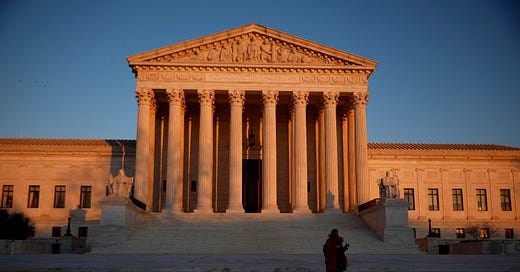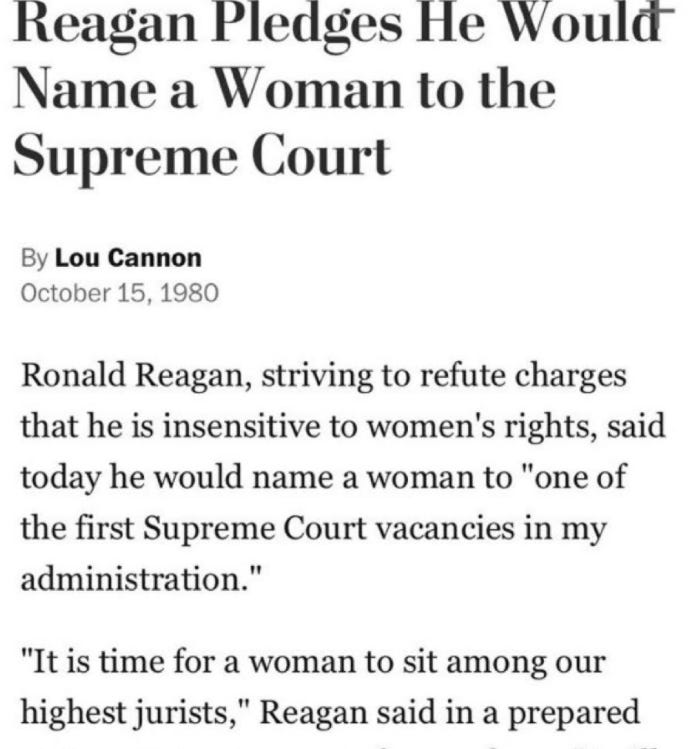
This might be a good day for Democrats to reflect on political reality: As my colleague Tim Miller has so eloquently pointed out, if they didn't have Joe Manchin in the senate, they'd probably have Senator Cletus Von Ivermectin (R).
And that would mean that Mitch McConnell would be able to block any Supreme Court pick that Joe Biden might make.
In the hours after the announcement that Justice Stephen Breyer was retiring, attention turned immediately to the fraught politics of a 50-50 senate, and many of the Twitterati found themselves wondering: What will Kyrsten Sinema and Manchin do now? This is a somewhat tricky question since, as Amber Phillips writes in today’s Wapo, “in recent weeks the party base has increasingly turned the two senators with the biggest independent streaks into punching bags.”
Manchin reportedly feels “badgered” by his colleagues and Democrats in Arizona just censured Sinema.
As near as one can tell, the strategy behind last week’s show-defeat on voting rights was designed to pressure or shame the two mavericks into line. If that was, indeed, the plan, it failed spectacularly, and ushered in a particularly awkward era of bad feelings.
So a reminder: the first rule of having a razor-thin majority is not to torch bridges, razors, or the boats you sailed in on. You may be angry or disappointed with a colleague, but a rational political party will always remember that someday they may need them. Someday is now.
Even so, it’s still likely that both Manchin and Sinema will support anyone Biden picks, because they have both consistently supported his lower court picks — including one of the front-runners for the SCOTUS seat, Judge Ketanji Brown Jackson.
But this should also be a time to go back over the math: The Dems cannot count to 50 without Manchin or Sinema. Without them, the GOP controls the senate.
In that case, their votes would be irrelevant, because McConnell would never even allow the nomination to come up for a vote. There wouldn’t even be hearings. (See Merrick Garland.)
Be careful what you wish for.
**
Biden’s litmus test
We have a pretty good idea of what Biden’s shortlist looks like. The NYT has profiles of some the leading candidates, including Judge Jackson, Judge J. Michelle Childs, and Justice Leondra R. Kruger.
The Atlantic tells us a bit about the early favorite:
Jackson, who is 51, fulfills a lot of requirements for the establishment set. She has the same Ivy League credentials as the sitting justices, having earned both her undergraduate and her law degree from Harvard and edited for the Harvard Law Review. She clerked for three federal judges—including Breyer, from 1999 to 2000. If nominated and confirmed, Jackson will follow the same track as Brett Kavanaugh, who also clerked for the justice he ultimately replaced. Also like Kavanaugh—and seven other current and former justices—Jackson would be coming directly from the D.C. Circuit Court of Appeals, the second-most important court in the country after the Supreme Court.
This is impressive. She and the other short-listers have solid credentials, and that should be the focus of the appointment/confirmation process.
Unfortunately, though, those credentials may be overshadowed.
During the heat of the primary contest, Biden pledged that he would appoint a black woman to the court, and he appears committed to keeping his promise.
But, in doing so, he may have done his own nominee a signal disservice, by putting racial/gender identity ahead of philosophy and credentials.
And that is a problem.
**
Yes, yes, yes. Other presidents have also made identity-based promises. Remember this?
Reagan kept his promise by appointing Sandra Day O’Connor to the Court. George H.W. Bush, who was anxious to name an African-American, picked Clarence Thomas.
By now, this sort of racial/gender politics has become almost reflexive in progressive circles, but even its supporters need to recognize its limitations and dangers.
“In a stroke,” write the editors of National Review, “[Biden] disqualified dozens of liberal and progressive jurists for no reason other than their race and gender. This is not a great start in selecting someone sworn to provide equal justice under law.”
Andrew Sullivan was even harsher.


Go ahead, take umbrage at my citation of Sullivan and the reactionaries at NR. The commentary at Fox News is even worse.
But that doesn’t mean they are wrong.
Think about it this way. In announcing that his pick would be constrained by racial/gender identity, Biden did indeed, tell a generation of young progressive jurists that they need not apply.
No one who looks like Stephen Breyer, or William Brennan, or Laurence Tribe would be considered.
But neither would Hispanics, including Hispanic women. No one who looks like Sonia Sotomayor will be considered.
Asians also need not apply. No Pakistani-Americans — men or women. No Native Americans.
No black men — not even Barack Obama.
Jews, probably not.
Ditto for white women. No credential, no jurisprudence, no brilliant legal scholarship can override their racial identity. So no Elena Kagen.
And here’s the kicker:
Under these limits, Ruth Bader Ginsburg — or rather the next generation RBG— would be ineligible for consideration because of the color of her skin.
**
Progressives are likely to brush off such concerns because it’s time.
But we shouldn’t be under any illusions about the political downsides of a race-based selection process, especially as the High Court itself will be taking up the question of racial preferences shortly.
Here’s a reality check: the public really dislikes this sort of thing. Polls suggest that race-based hiring/admissions are not just unpopular — they are very unpopular.
In 2019, a Pew Research Center survey found that “that most Americans (73%) say colleges and universities should not consider race or ethnicity when making decisions about student admissions. Just 7% say race should be a major factor in college admissions, while 19% say it should be a minor factor.”
How strong is the opposition?
In 2020, California voters decisively rejected a proposal to repeal the state’s ban on preferential treatment based on race.
A "no" vote opposed this constitutional amendment, thereby keeping Proposition 209 (1996), which stated that the government and public institutions cannot discriminate against or grant preferential treatment to persons on the basis of race, sex, color, ethnicity, or national origin in public employment, public education, and public contracting.
The vote was not close. The move to repeal the ban on racial preferences lost by more than 2.4 million votes in California — on the same day that Biden won by nearly 20 points — and more than 5 million votes.
In freaking California.
Exit take: All indications are that Judge Ketanji Brown Jackson would be an impressive choice and could go on to be a consequential Supreme Court justice. But, in retrospect, Biden would have been better off putting the content of her character and her legal mind ahead of her identity.
Bonus:
Dumbing Down the Schools
The Rubification of American education continues.


Quick Hits
1. Everybody’s Getting CRT Wrong on Purpose
Make sure you read this brilliant piece by Mona Charen in today’s Bulwark:
If you were judging by much of the mainstream press coverage, you would think that CRT is just a movement to ensure that the history of slavery, racism, and Jim Crow is not neglected in America’s classrooms. But 1) large percentages of both Republicans and Democrats favor teaching those things, and 2) that’s not what CRT is.
In their book Critical Race Theory: An Introduction, Richard Delgado and Jean Stefancic state forthrightly that “Critical race theory questions the very foundations of the liberal order, including equality theory, legal reasoning, Enlightenment rationalism, and neutral principles of constitutional law.” Robin DiAngelo, author of White Fragility, rejects the notion that racism is a character flaw in some individuals, declaring instead that “White identity is inherently racist.” That marks a dramatic departure from the traditional understanding of racism.
2. What Happens When a Globalist Cuck Tries to Go Full MAGA?
David McCormick is ready to find out, writes Tim Miller.
What does it mean to be MAGA?
Is there a list of policies that must be adhered to? Does it require having a truculent tone, a way of being in the world, that can only be detected by fellow believers? Maybe it’s just a mandate to own libs, day and night? Or perhaps MAGA is an exercise in soulcraft, where all sins can be forgiven and your soul saved by grace through faith in Trump, the man, alone?
In Pennsylvania, David McCormick—who is the husband of Trump official Dina Powell and was the CEO, until this month, of the world’s largest hedge fund—intends to find out. He has decided to run for Senate, starting with a race against Dr. Oz for the Republican nomination.
On paper, McCormick appears to be the anti-MAGA. During the Bush administration he was the “Bailout Czar’s” boss—this during the financial crisis that populist high priests such as Steve Bannon identify as the origin story of the MAGA movement.
3. Biden Is Learning How to Deal with Putin
David Kramer in today’s Bulwark:
So this week was a better one for the Biden administration in addressing the Putin challenge. But the week is not over, nor is the crisis. The Biden administration needs to continue down this stronger path and abandon hopes that we can get along with Putin. It is the only way to avert a crisis in Europe.


















I don't see a whole lot of difference between Reagan's groundbreaking nomination of a woman to the Supreme Court, after he made the commitment to do so, and Joe Biden's groundbreaking potential nomination of a black female jurist to the Supreme Court after he made a similar commitment.
It's fair to note, IMO, that black jurists, especially female black jurists, are often overlooked entirely in the nomination process. Which is what makes spotlighting them stand out.
Given that more than half our population is female, and we're fast becoming a majority minority country, it shouldn't be cause for pearl clutching when a president looks at the high court and sees a lack of diversity, both racial and ideological. Despite the performative temper tantrums on the right.
Finally, I don't recall hearing alarmist charges of 'identity politics' when nearly all of Donald Trump's nominees to the federal bench, including SCOTUS, were white. Maybe, just maybe, it's possible that President Biden is looking for highly qualified judicial nominees who happen to be black. That's not a bad a thing. And like VP Harris, it would be another history-making choice. These women have earned the right to consideration.
That makes me proud. As an American. And as a woman.
I SO look forward to the day when we don't have announcements about the "first black woman" or "first openly gay man" or "first trans woman" or "first Native American" in a position, because that will mean it's just normal. But we are not remotely there yet. So until then, let's celebrate the expanding diversity that truly makes our country exceptional.